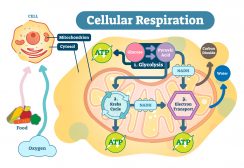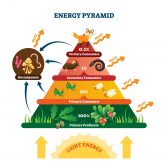Definition
noun, plural: ATP synthases
An enzyme that catalyzes the formation of ATP from the phosphorylation of ADP with inorganic phosphate, using a form of energy, such as the energy from a proton gradient.
Supplement
This enzyme consists of two major segments: Fo portion, the transmembrane proton channel and F1 portion, the catalytic component. The proton channel component allows the diffusion of protons (hydrogen ions) from an area where there are more hydrogen ions to an area where there are less hydrogen ions due to a proton gradient. As the proton (H+ ion) moves down the concentration gradient this moves the enzyme in a spinning motion, which brings ADP and inorganic phosphate together to form a bond, thus creating ATP molecule. The resulting ATP molecule is released so that a new ADP molecule can enter for another phosphorylation.
This enzyme can also work in reverse using the energy release from ATP hydrolysis to pump protons against their thermodynamic gradient. Since it can also use ATP as a source of energy it is also aptly called ATP synthetase.
See also: chemiosmosis
Dictionary > ATP synthase
You will also like...

Plant Water Regulation
Plants need to regulate water in order to stay upright and structurally stable. Find out the different evolutionary adap..

Freshwater Communities & Lentic Waters
Lentic or still water communities can vary greatly in appearance -- from a small temporary puddle to a large lake. The s..

Plant Biology
Plantlife can be studied at a variety of levels, from the molecular, genetic and biochemical level through organelles, c..

Cell Respiration
Cell respiration is the process of creating ATP. It is "respiration" because it utilizes oxygen. Know the different stag..

Freshwater Community Energy Relationships – Producers & Consumers
This tutorial looks at the relationship between organisms. It also explores how energy is passed on in the food chain an..

Early Mammals on Earth
The Earth's ecosphere was rapidly changing and throwing up a wide range of ecological niches that new adaptive organisms..

